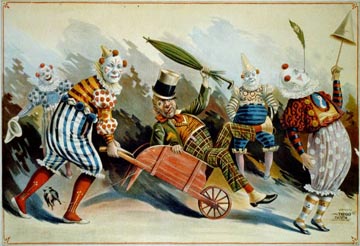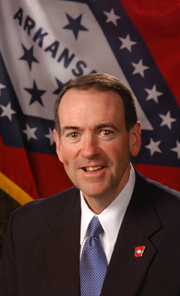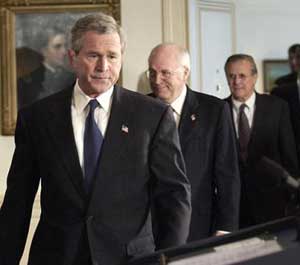 It says here “The musth can be defined as a periodical change of the behaviour of elephant bulls, which can last from some weeks up to some months. This change has got hormonal reasons. In the musth period a bull produces 40 to 60 times more of testosterone (male sex hormone) than in the non-musth time.” A bull elephant in musth exhibits “autistic behaviour” and will aggressively attack just about anything that moves.
It says here “The musth can be defined as a periodical change of the behaviour of elephant bulls, which can last from some weeks up to some months. This change has got hormonal reasons. In the musth period a bull produces 40 to 60 times more of testosterone (male sex hormone) than in the non-musth time.” A bull elephant in musth exhibits “autistic behaviour” and will aggressively attack just about anything that moves.
“Bull elephants in musth” pretty well describes the Republican presidential candidates in Iowa.
Romney is ahead in Iowa, according to a new U. of Iowa poll, so let’s start with him. Yesterday Romney charged into Giuliani with a claim that as mayor, Giuliani turned New York City into a sanctuary for illegal immigrants. CBS News reports:
“If you look at lists compiled on Web sites of sanctuary cities, New York is at the top of the list when Mayor Giuliani was mayor,” Romney said at while campaigning in Iowa. “He instructed city workers not to provide information to the federal government that would allow them to enforce the law. New York City was the poster child for sanctuary cities in the country.”
Giuliani, also campaigning in Iowa, offered this response: “Frankly, that designation would not apply to New York City. What you got to look at in fairness to is the overall results — and no city in terms of crime, safety, dealing with illegality of all different kinds has done a better job than New York City.”
ABC News explains that New York became a “sanctuary city” by executive order signed by Mayor Ed Koch in 1989. But Giuliani did, in fact, maintain and defend the policy, and generally had a benevolent attitude toward illegal aliens who used city services.
DownWithTyranny writes,
The Republicans figure their best bet to hold down their losses in 2008 will be an all out Know-Nothing assault on immigrants and foreigners. They plan to demonize “illegal immigrants” day and night and stoke the flames of divisiveness and bigotry and hatred. The tactics often works for the right. But they’re not supposed to turn it on each other. Mormon Mitt couldn’t help himself. He had nowhere else to go. So today’s headlines are all about Giuliani’s catering and pandering to the hated and dangerous illegals.
Romney is being attacked in turn for his abortion stance, whatever it is. Iowans recently were “treated” to this robo-call, paid for by Brownback for President:
“Hello, this is an urgent alert for pro-life Iowa Republican voters. The Straw Poll is coming up in a few weeks and Mitt Romney is telling Iowans he’s firmly pro-life. Nothing could be further from the truth. As late as 2005, Mitt Romney pledged to support and uphold pro-abortion policies and passed taxpayer funding of abortions in Massachusetts. His wife Ann has contributed money to Planned Parenthood. Mitt told the National Abortion Rights Action League that ‘you need someone like me in Washington.’ Romney still supports life-destructive embryonic stem cell research and he still opposes the Human Life Amendment which is part of the Republican Party’s platform. Stand up for life and say no to Romney. This call has been paid for by Brownback for President.”
Mitt’s response: “I get tired of people that are holier than thou because they’ve been pro-life longer than I have.” (See also Joan Vennochi in today’s Boston Globe, who says that Mitt’s explanations for his pro-life past are, um, fanciful.)
Meanwhile, the Washington Times reports, “Mr. Paul’s campaign hands out fliers charging Mr. Brownback and Sen. John McCain of Arizona with having voted for a spending bill in 2005 that sends taxpayer dollars to Planned Parenthood.”
I’ll let DownWithTyranny explain Mitt’s other recent gaffe:
Yesterday Romney committed political suicide with his typically lame– though taped– answer to a question about why his very pro-war Mormon boys don’t serve in the military. The Republican base was stunned– and started gagging. Realizing the enormity of the screw-up of comparing his sons’ campaigning for their wealthy father to the sacrifice American families are making sending their sons and daughters to fight in Afghanistan and Iraq, the Romney braintrust immediately started screaming “out of context.” They released the video, proving for everyone who didn’t witness it that it was totally in context and that Romney is just what he appears to be: just one of the bunch of pathetic pygmiesâ„¢ and the ultimate Empty Suit.
 I don’t know if it’s possible for any of these clowns to commit political suicide. One of ’em could show up on the next nationally televised debate drunk and naked, and media would spin right over it. But let’s go on to …
I don’t know if it’s possible for any of these clowns to commit political suicide. One of ’em could show up on the next nationally televised debate drunk and naked, and media would spin right over it. But let’s go on to …
Rudy! He’s number two. And the Washington Times says Rudy’s got an abortion problem.
In a state where “choose life” yard signs dot the mowed grass between the cornfields and country lanes, abortion can be a make-or-break issue for Republicans, both in the top tier and among those such as Mr. Tancredo looking to break out of the lower tier.
Dedicated pro-life voters make up more than 60 percent of potential Republican caucusgoers, and an even larger portion of the dedicated activists who get their family, friends and church members to turn out to vote. As a result, the issue has popped up continuously in the weeks leading up to Saturday’s Iowa Republican Party straw poll.
Rudy hasn’t even pretended not to support abortion rights. The Washington Times says “no such strong, credible [pro-choice] candidate has emerged in the modern era,” thereby admitting the GOP isn’t as open to pro-choice candidates as it claims to be. But since Rudy is the only pro-choice choice, maybe he’ll exceed expectations.
Several of the candidates are being attacked on religion. Mitt Romney has been blasted because of his Mormonism. And apparently being a Catholic or a Protestant isn’t safe, either. Wonkette:
There was a minor blow-up this past week between the two Republican candidates who are aiming for the religiouser-than-thou vote: Sam Brownback, a devotee of the one true Catholic and Apostolic Church, and Mike Huckabee, a adherent to a reformed and protestant sect of the Christian religion. See, Brownback used to be a protestant too, and an evangelical minister who converted the other way and is supporting Huckabee said in an obscure e-mail to nobodies that “I know Senator Brownback converted to Roman Catholicism in 2002 … Frankly, as a recovering Catholic myself, that is all I need to know about his discernment when compared to [Huckabee]’s.â€
This apparently was treated as the equivalent of calling Brownback a “mackerel-snapper†or some similarly comical 19th-century epithet, so Huckabee tried to defuse things by calling Brownback a “Christian brother†but then Huckabee’s (Catholic) campaign manager clarified that Brownback was a particularly whiny Christian brother. Then Brownback called Huckabee a “heretic†and Huckabee called Brownback a “pimp for the Whore of Babylon in Rome†and Brownback threatened to have Huckabee tortured to death by the Inquisition
I believe that last part was a tad exaggerated for comic effect.
.You know I’m not a Rudy Giuliani fan, but for once I’m going to defend him. This is from the New York Daily News:
Rudy Giuliani may be trying to woo religious conservatives, but the former mayor all but took an oath of silence yesterday when asked if he was a practicing Catholic.
“My religious affiliation … and the degree to which I am a good or not so good Catholic, I prefer to leave to the priests,” the Republican presidential hopeful told a voter at a forum in Bettendorf, Iowa.
Another questioner mentioned President Bush’s success among Catholics and urged Giuliani to explain his faith. Again, Giuliani took a pass.
“That’s a matter of individual conscience,” Giuliani said. “I don’t think there should be a religious test for public office.”
That’s the right answer. It may not be the politically smart answer, and it may be that he’s just covering up for not being a good Catholic. But it’s the right answer, even so. The GOP has made a big bleeping deal about how religious they all are compared to Democrats, and now they’re squabbling over religion. I believe this is what the Bard called “Hoist with his own petard.”
Some experts said the former mayor – who as a young man considered joining the priesthood – would be wiser to confront his struggles with his church head-on.
“It’s better to be straightforward and say, ‘I am not right with my church, and I understand that,'” said Prof. Charles Dunn of Regent University in Virginia, an expert on conservatism. “Honesty is the only policy, and with evangelicals that would play better.”
Did you know that Abraham Lincoln had no church affiliation at all? And that in 1860, nobody bleeping cared?
Fred Thompson, who is not officially running, is third. He’ll make his first trip to Iowa as an alleged campaigner this weekend. His campaign slogan is “I’m not one of these other clowns.”
Whoever wins this turkey shoot will at least be able to say he’s a big contrast to whoever the Dems nominate. Rudy Giuliani explained this at a dinner in Council Bluffs.
Giuliani called the Democratic field the party’s most liberal in memory.
“It’s beyond their just embracing loss in Iraq,” Giuliani said. “It sounds to me like they want to repeat the Clinton administration.”
Ah, yes, those eight long years of peace and prosperity. Such a trial.
Giuliani said he was struck by the far-left positions taken by all the candidates. On virtually every issue, Giuliani argued, Democrats have ceded the political middle and moved left to court key party interest groups.
Unlike the Republicans, who are too busy pandering to anti-immigrant and anti-abortion factions to worry about pandering to interest groups. Oh, wait …
Send in the clowns.


 Arkansas Gov.
Arkansas Gov.  Huckabee may be a nice fella, but he is waaaaaay right wing. On any social issue you can name — abortion, embryonic stem cell research, gay marriage, gay adoption, gun control — he is as firmly right wing as a person can be without falling off the planet. Would the press soft-pedal his extremism just because they think he’s a nice fella? You bet they would. Plus, he’s a governor, which the CW says is better than being a senator — or former mayor of New York City — if you want a presidential nomination. This means that if he begins to get some media attention, he could be a real contender for the Republican nomination.
Huckabee may be a nice fella, but he is waaaaaay right wing. On any social issue you can name — abortion, embryonic stem cell research, gay marriage, gay adoption, gun control — he is as firmly right wing as a person can be without falling off the planet. Would the press soft-pedal his extremism just because they think he’s a nice fella? You bet they would. Plus, he’s a governor, which the CW says is better than being a senator — or former mayor of New York City — if you want a presidential nomination. This means that if he begins to get some media attention, he could be a real contender for the Republican nomination.
 Yet those are the tasks in front of us — injecting sanity into our foreign policy, restoring the Constitution, establishing stronger national security. We all want parties to last forever, but they never do, and when they’re over there’s a mess to be cleaned up.
Yet those are the tasks in front of us — injecting sanity into our foreign policy, restoring the Constitution, establishing stronger national security. We all want parties to last forever, but they never do, and when they’re over there’s a mess to be cleaned up.  It says
It says 